-
 Bitcoin
Bitcoin $105,713.8056
3.44% -
 Ethereum
Ethereum $2,448.3377
7.44% -
 Tether USDt
Tether USDt $1.0005
-0.01% -
 XRP
XRP $2.1892
8.88% -
 BNB
BNB $642.1253
2.79% -
 Solana
Solana $144.4049
6.28% -
 USDC
USDC $1.0000
-0.02% -
 TRON
TRON $0.2738
1.20% -
 Dogecoin
Dogecoin $0.1642
6.61% -
 Cardano
Cardano $0.5861
7.46% -
 Hyperliquid
Hyperliquid $38.0472
6.61% -
 Sui
Sui $2.7809
11.17% -
 Chainlink
Chainlink $13.5044
14.64% -
 Bitcoin Cash
Bitcoin Cash $450.9966
0.93% -
 UNUS SED LEO
UNUS SED LEO $9.1282
0.68% -
 Stellar
Stellar $0.2478
7.70% -
 Avalanche
Avalanche $18.1694
8.09% -
 Toncoin
Toncoin $2.9073
3.99% -
 Shiba Inu
Shiba Inu $0.0...01166
6.14% -
 Hedera
Hedera $0.1525
10.64% -
 Litecoin
Litecoin $84.4484
3.86% -
 Monero
Monero $319.2184
7.30% -
 Ethena USDe
Ethena USDe $1.0006
0.02% -
 Polkadot
Polkadot $3.4709
8.34% -
 Dai
Dai $0.9999
-0.02% -
 Bitget Token
Bitget Token $4.2814
6.14% -
 Uniswap
Uniswap $7.0518
12.26% -
 Pepe
Pepe $0.0...01001
10.11% -
 Pi
Pi $0.5427
7.23% -
 Aave
Aave $265.8182
14.99%
How is the QR code of a wallet address generated?
A wallet address is a unique identifier derived from cryptographic keys, used to send and receive cryptocurrencies securely on blockchain networks.
Jun 13, 2025 at 10:49 pm
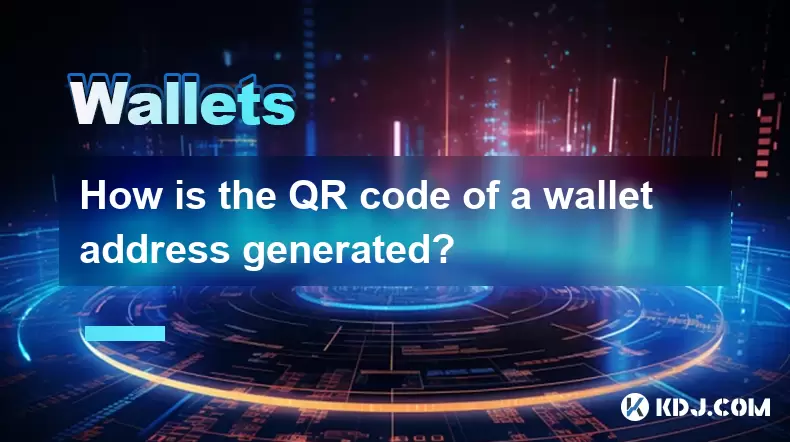
Understanding the Basics of a Wallet Address
A wallet address is a unique identifier used in blockchain networks to send and receive cryptocurrencies. It is derived from a pair of cryptographic keys — a private key and a public key. The private key is kept secret and grants control over the funds, while the public key is used to generate the wallet address. This address is what users share with others to receive crypto payments.
The wallet address is typically represented as a string of alphanumeric characters. However, for convenience and error prevention during transactions, this string is often converted into a QR code, which can be easily scanned using mobile or desktop wallets.
The Role of QR Codes in Cryptocurrency Transactions
A QR (Quick Response) code is a two-dimensional barcode that can store data such as text, URLs, or other information. In the context of cryptocurrency, QR codes are used to represent wallet addresses visually. They eliminate the need to manually enter long alphanumeric strings, reducing the risk of typos and incorrect transfers.
When a user generates a QR code for their wallet address, they are essentially encoding the address into a scannable image. Wallet applications and online tools use specific algorithms to convert the wallet address into binary data, then format it into a matrix barcode that scanners can interpret accurately.
Step-by-Step Process to Generate a QR Code for a Wallet Address
To create a QR code for a wallet address, you must first ensure that the wallet address is correctly formatted and verified. Once confirmed, the following steps outline how the QR code is generated:
- Obtain the wallet address: This can be copied directly from your wallet interface.
- Choose a reliable QR code generator: Many online tools and libraries exist, such as QRCode.js, ZXing, or built-in features within wallet apps.
- Input the wallet address into the generator: Paste the address into the designated input field.
- Select appropriate encoding options: Most generators allow customization like size, color, and error correction levels.
- Generate and download the QR code: After processing, the tool outputs the QR code image in formats like PNG or JPEG.
Some advanced tools also allow embedding logos or branding elements into the QR code without compromising its functionality.
Technical Aspects Behind QR Code Generation
Underneath the surface, generating a QR code involves several technical layers. First, the wallet address undergoes UTF-8 encoding, converting the string into binary data. Next, the QR code generator applies error correction algorithms (like Reed-Solomon coding), ensuring that even if part of the image is damaged, the data can still be recovered.
The binary data is then mapped onto a grid of black and white squares, forming the recognizable QR matrix pattern. The version of the QR code (ranging from 1 to 40) determines the grid size and data capacity. For standard wallet addresses, versions 1 through 5 are usually sufficient.
Each QR code also includes position detection patterns, timing patterns, and format information to help scanners align and decode the image accurately.
Security Considerations When Using QR Codes
While QR codes offer convenience, they also pose potential security risks. A malicious actor could replace a legitimate QR code with one pointing to their own wallet address. Therefore, it's crucial to verify the contents of a QR code before scanning, especially when receiving large sums.
Additionally, always ensure that the QR code generation tool is trustworthy. Open-source libraries like ZXing or qrcode npm packages are preferred because their source code can be audited for security flaws. Avoid using unknown third-party websites that may log or manipulate the data being encoded.
If possible, cross-check the generated QR code by scanning it with a separate device or application to confirm that it resolves to the correct wallet address.
Frequently Asked Questions
Q: Can I generate a QR code offline without using online tools?
Yes, you can generate a QR code offline using open-source libraries or software installed locally on your computer. Tools like QRCode.js or Python’s qrcode library allow you to generate QR codes programmatically without an internet connection.
Q: What happens if the QR code gets damaged or partially obscured?
Modern QR codes include error correction mechanisms that allow them to remain scannable even if up to 30% of the image is damaged or missing. The level of resilience depends on the selected error correction mode during generation.
Q: Is there a difference between a wallet address QR code and a transaction QR code?
Yes, a wallet address QR code only contains the recipient’s public address. In contrast, a transaction QR code may include additional parameters like amount, message, or network type (e.g., testnet vs mainnet). These extra fields enable direct sending without manual entry.
Q: Are all wallet addresses compatible with QR code generation?
Most modern wallet addresses are fully compatible with QR code generation. However, certain legacy formats or exotic blockchain protocols might require special handling or conversion before they can be encoded properly. Always verify compatibility with your chosen QR code generator.
Disclaimer:info@kdj.com
The information provided is not trading advice. kdj.com does not assume any responsibility for any investments made based on the information provided in this article. Cryptocurrencies are highly volatile and it is highly recommended that you invest with caution after thorough research!
If you believe that the content used on this website infringes your copyright, please contact us immediately (info@kdj.com) and we will delete it promptly.
- BlockDAG's Bold Move: A $100 Million Token Airdrop Fuels Ecosystem Growth
- 2025-06-25 00:45:12
- Aero Crypto (AERO): 100x Altcoin or Just Jumped 14%? Decoding the Hype
- 2025-06-25 00:25:12
- Banish Flies with a Coin Trick? The Buzz Around This Bizarre Hack
- 2025-06-25 00:45:12
- Bitcoin, Mortgages, and Finance: A New Era?
- 2025-06-25 00:25:12
- Mastercard, Fiserv, and Stablecoins: A New Era of Payments?
- 2025-06-25 00:55:12
- Circle Stock, Stablecoin Competition, and Wall Street: A New York Minute
- 2025-06-25 00:55:12
Related knowledge
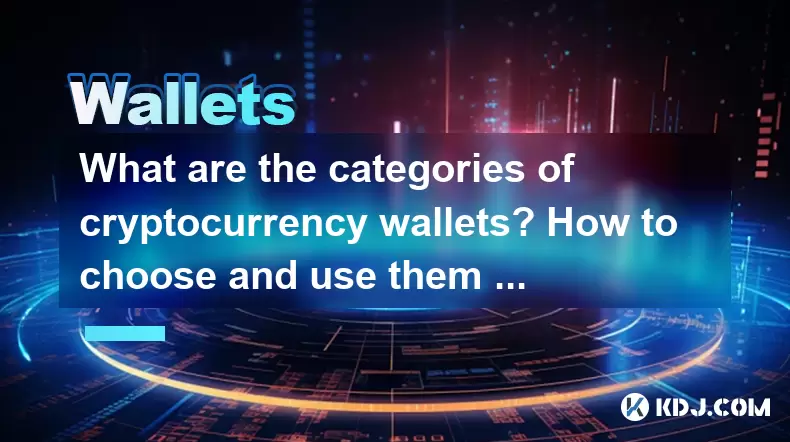
What are the categories of cryptocurrency wallets? How to choose and use them safely?
Jun 21,2025 at 10:42pm
Understanding Cryptocurrency WalletsCryptocurrency wallets are essential tools for anyone involved in the digital asset ecosystem. They allow users to store, send, and receive cryptocurrencies securely. Unlike traditional wallets that hold physical money, crypto wallets manage cryptographic keys—private and public—which interact with blockchain networks...
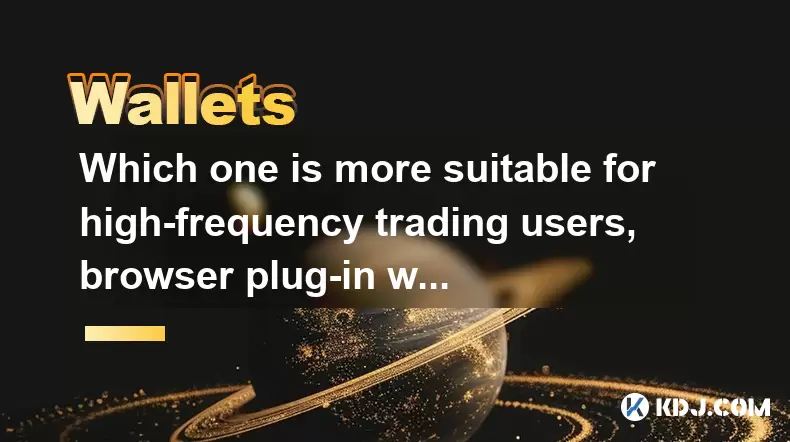
Which one is more suitable for high-frequency trading users, browser plug-in wallets or independent application wallets?
Jun 23,2025 at 08:22am
Understanding the Role of Wallets in High-Frequency TradingFor high-frequency trading (HFT) users in the cryptocurrency market, wallet selection is critical due to the need for speed, security, and seamless integration with trading platforms. HFT involves executing a large number of trades within seconds or even milliseconds, which demands a wallet that...
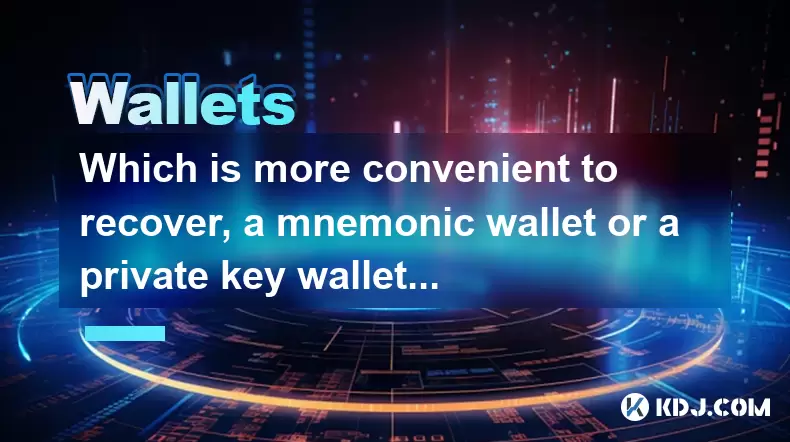
Which is more convenient to recover, a mnemonic wallet or a private key wallet? Will security be compromised?
Jun 20,2025 at 06:36am
Understanding Mnemonic Wallets and Private Key WalletsIn the world of cryptocurrency, wallet recovery is a crucial aspect that users must understand before storing digital assets. Two popular methods for securing and recovering wallets are mnemonic phrases and private keys. Both serve as gateways to access funds, but they differ significantly in terms o...
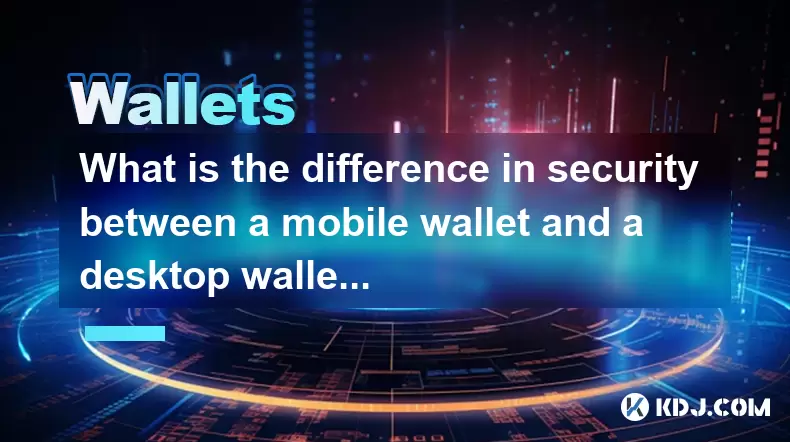
What is the difference in security between a mobile wallet and a desktop wallet?
Jun 22,2025 at 12:35pm
Understanding the Security Aspects of Mobile WalletsMobile wallets are digital wallets designed to run on smartphones, allowing users to store, send, and receive cryptocurrencies conveniently. The security of mobile wallets largely depends on how well the device is protected from malware, phishing attacks, and unauthorized access. One key feature of mob...
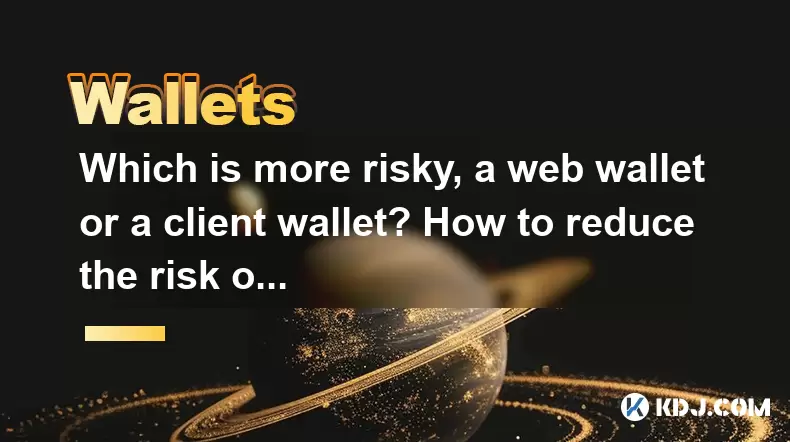
Which is more risky, a web wallet or a client wallet? How to reduce the risk of use?
Jun 22,2025 at 09:21pm
Understanding Web Wallets and Client WalletsWhen managing cryptocurrencies, choosing the right type of wallet is crucial. Web wallets and client wallets are two popular options among users, each with its own set of advantages and disadvantages. A web wallet operates through a browser interface and is usually hosted online by third-party services. This m...
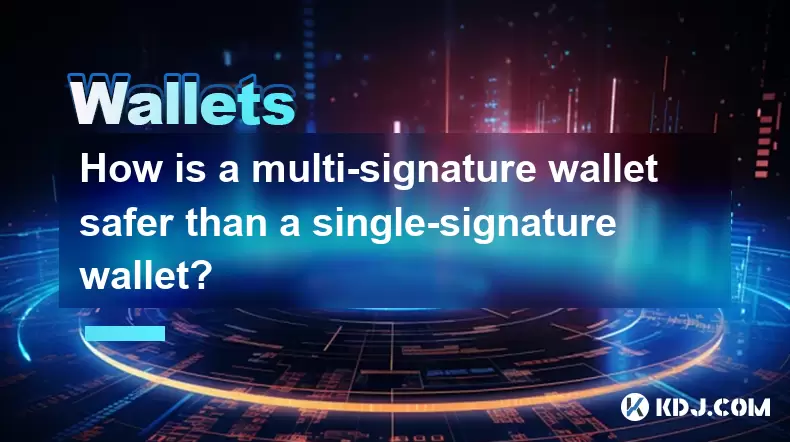
How is a multi-signature wallet safer than a single-signature wallet?
Jun 21,2025 at 07:56pm
Understanding Signature Mechanisms in Cryptocurrency WalletsIn the world of cryptocurrency, securing digital assets is paramount. One of the core aspects of this security lies in the signature mechanism used by wallets. A single-signature wallet requires only one private key to authorize a transaction. This means that if an attacker gains access to that...

What are the categories of cryptocurrency wallets? How to choose and use them safely?
Jun 21,2025 at 10:42pm
Understanding Cryptocurrency WalletsCryptocurrency wallets are essential tools for anyone involved in the digital asset ecosystem. They allow users to store, send, and receive cryptocurrencies securely. Unlike traditional wallets that hold physical money, crypto wallets manage cryptographic keys—private and public—which interact with blockchain networks...

Which one is more suitable for high-frequency trading users, browser plug-in wallets or independent application wallets?
Jun 23,2025 at 08:22am
Understanding the Role of Wallets in High-Frequency TradingFor high-frequency trading (HFT) users in the cryptocurrency market, wallet selection is critical due to the need for speed, security, and seamless integration with trading platforms. HFT involves executing a large number of trades within seconds or even milliseconds, which demands a wallet that...

Which is more convenient to recover, a mnemonic wallet or a private key wallet? Will security be compromised?
Jun 20,2025 at 06:36am
Understanding Mnemonic Wallets and Private Key WalletsIn the world of cryptocurrency, wallet recovery is a crucial aspect that users must understand before storing digital assets. Two popular methods for securing and recovering wallets are mnemonic phrases and private keys. Both serve as gateways to access funds, but they differ significantly in terms o...

What is the difference in security between a mobile wallet and a desktop wallet?
Jun 22,2025 at 12:35pm
Understanding the Security Aspects of Mobile WalletsMobile wallets are digital wallets designed to run on smartphones, allowing users to store, send, and receive cryptocurrencies conveniently. The security of mobile wallets largely depends on how well the device is protected from malware, phishing attacks, and unauthorized access. One key feature of mob...

Which is more risky, a web wallet or a client wallet? How to reduce the risk of use?
Jun 22,2025 at 09:21pm
Understanding Web Wallets and Client WalletsWhen managing cryptocurrencies, choosing the right type of wallet is crucial. Web wallets and client wallets are two popular options among users, each with its own set of advantages and disadvantages. A web wallet operates through a browser interface and is usually hosted online by third-party services. This m...

How is a multi-signature wallet safer than a single-signature wallet?
Jun 21,2025 at 07:56pm
Understanding Signature Mechanisms in Cryptocurrency WalletsIn the world of cryptocurrency, securing digital assets is paramount. One of the core aspects of this security lies in the signature mechanism used by wallets. A single-signature wallet requires only one private key to authorize a transaction. This means that if an attacker gains access to that...
See all articles


























































